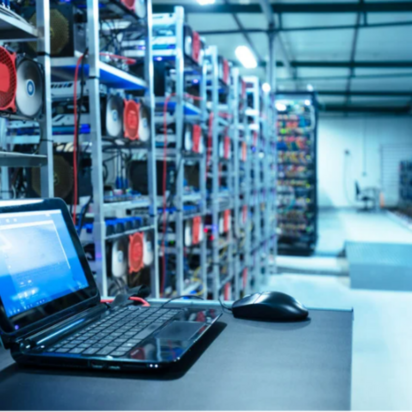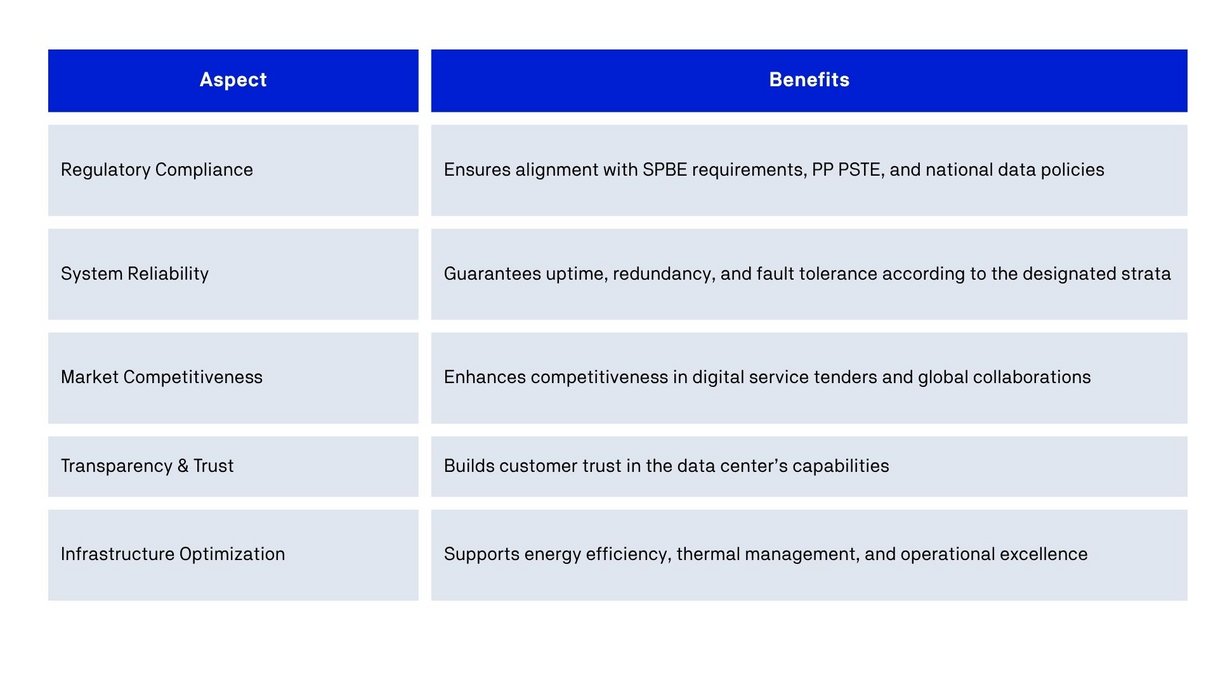SNI 8799 Data Center
Helps standardize Indonesian data centers, ensuring reliable, secure, and efficient operations through technical, management, and audit guidelines.

Helps standardize Indonesian data centers, ensuring reliable, secure, and efficient operations through technical, management, and audit guidelines.

Ensuring the Reliability of Data Center Infrastructure in the Digital Transformation Era
Data Centers = Critical Infrastructure for the Digital and AI Era
Data centers serve as a key enabler for various national and global agendas, including:
Without reliable, scalable, and standards-compliant data centers, digital services are at risk of failure, disruption, or insecurity — threatening economic stability, public services, and technological innovation.
The application of standards ensures that data centers are built and operated in accordance with the required levels of reliability, based on the availability, capacity, security, and efficiency of both core and supporting infrastructure.
What is SNI 8799?
SNI 8799 (Indonesian National Standard) titled Information Technology — Data Center, is a national standard developed independently and first released in 2019 in three parts. This standard was developed by Technical Committee 35-01 for Information Technology. It was established to standardize data centers operating within Indonesia, whether for public electronic service providers or private/internal use.
In 2023, revisions were made to Parts 1 and 2 of SNI 8799, updating them to reflect evolving technological and regulatory needs.
The SNI 8799 Series consists of three parts:
These standards ensure that data centers are designed and operated to meet necessary levels of reliability by addressing the availability, capacity, security, and efficiency of their core and supporting infrastructure.
Key Highlights of SNI 8799
SNI 8799-1:2023 — Technical Specifications:
This standard outlines the following technical requirements:
SNI 8799-2:2023 — Data Center Management System
This part defines requirements for a data center management system using the harmonized structure (Clauses 1 to 10), aligning with the framework for Management System Standards (MSS) — including identical clause numbers, titles, core definitions, and terms.
Indonesia can take pride in this development, as the 2023 revision of Part 2 makes it the first standardized data center management system in the world.
SNI 8799-2:2023 — Data Center Management System
This part defines requirements for a data center management system using the harmonized structure (Clauses 1 to 10), aligning with the framework for Management System Standards (MSS) — including identical clause numbers, titles, core definitions, and terms.
Indonesia can take pride in this development, as the 2023 revision of Part 2 makes it the first standardized data center management system in the world.
SNI 8799-3:2019 — Data Center Audit Guidelines
This part provides audit guidance for implementing SNI 8799. Since Part 2 outlines a management system, internal audits must be conducted using SNI 8799-3 as a reference.
Before a certification audit is performed by certification body, internal audits and management reviews are mandatory to validate conformance claims.
What is Data Center Certification Based on SNI 8799?
Data center certification based on SNI 8799 is a conformity assessment against the requirements outlined in the following standards:
The certification process is carried out based on the data center strata, which reflects the level of availability of the data center’s functions and services.
Strata Classification of Data Centers
Data center strata are categorized according to the level of infrastructure availability and redundancy:
This certification can be applied for by Indonesian-registered legal entities operating data centers within the territory of the Republic of Indonesia.
Why is SNI 8799 Certification Important Today?
1. Data Centers as Critical Digital Infrastructure
In the digital era, data centers serve as the backbone for both public and commercial digital services, including:
2. The Digital Transformation Boom
With both government and private sectors racing to build digital services, failure to establish scalable and reliable data center infrastructure puts digital transformation at risk.
3. Regulatory Compliance & Data Sovereignty
Regulations such as Presidential Regulation No. 95/2018 on SPBE, Government Regulation No. 71/2019 on Electronic Systems and Transactions mandate that strategic data and public services be hosted in standards-compliant national data centers, and Keputusan Menteri Komunikasi dan Informatika Nomor 519 Tahun 2024 tentang Penyelenggaraan Pusat Data Nasional.
4. AI & Machine Learning Requirements
AI technologies demand high computing power and large-scale storage. Data centers must ensure energy efficiency, temperature stability, and high availability to support these workloads.
5. Indonesia as a Regional Data Center Hub
With growing global investment interest in Indonesia as a Southeast Asia data center hub, SNI 8799 certification enhances the credibility of national players, building trust among investors and customers alike.
What are the Requirements and Procedures for SNI 8799 Certification?
Before undergoing an audit or submitting a certification request, a Data Center Operator must:

1. SNI 8799 Training & Workshops
TÜV NORD Indonesia provides a range of training services on SNI 8799, including:
2. Self-Evaluation Assistance
We offer support services to assist organizations in conducting SNI 8799 Data Center Self-Evaluations, helping to prepare for successful certification.
3. Conformity Assessment / Certification of SNI 8799
TÜV NORD Indonesia delivers certification services for all data center strata:
Organizations operating electronic systems and managing data centers in Indonesia, including:
1. Our technical audit and expert team has proven expertise in data center certification, holding international credentials such as:
2. We are a subsidiary of TÜV NORD GROUP, Germany, with long-standing experience in certifying critical infrastructure, including data centers using international standards like TSI Certification for Data Center.
3. We offer services that are fast, objective, and tailored to your organizational needs.
4. Our approach is solution-driven, focused on continuous improvement.